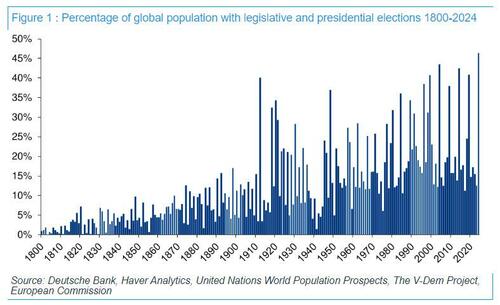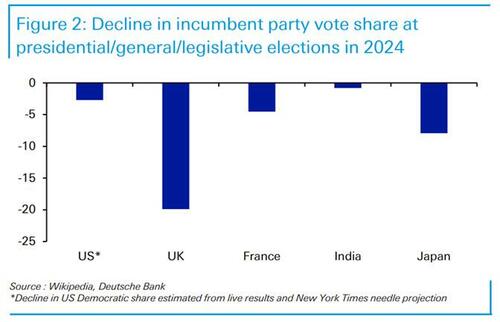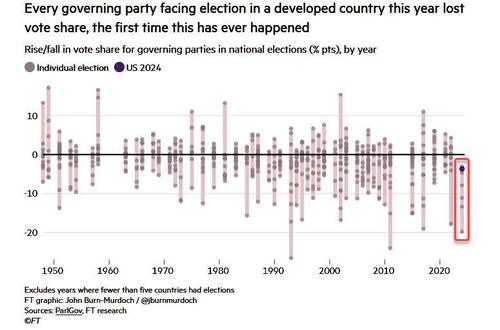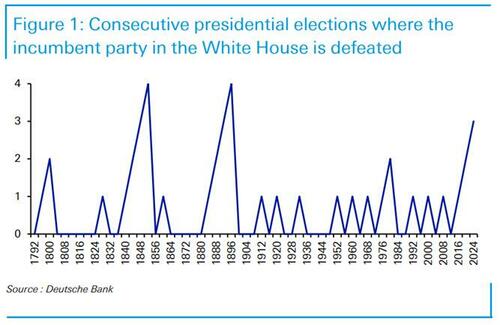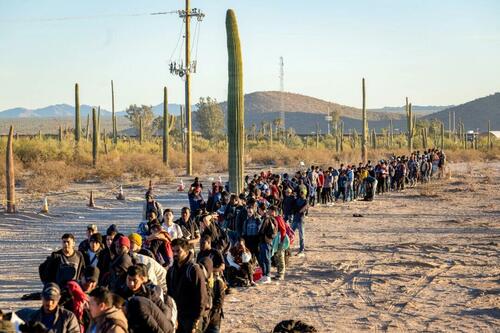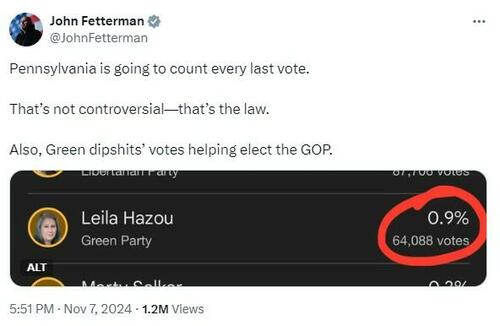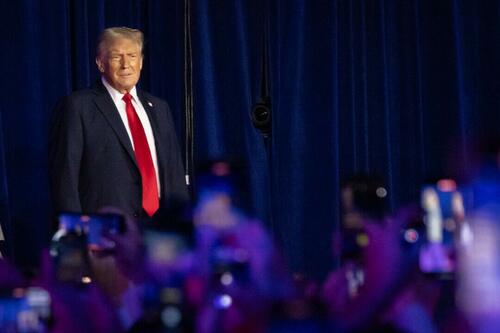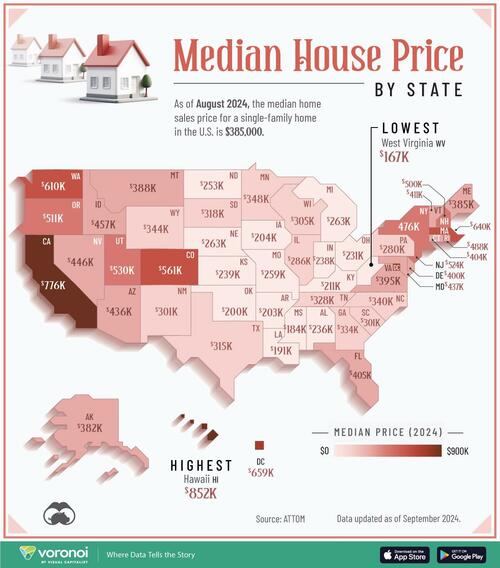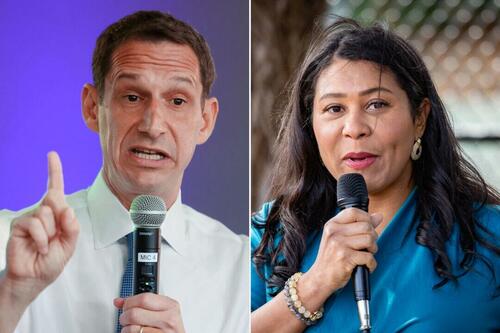Authored by Andrew Korybko via Substack,
Putin might agree to freeze the conflict along the Line of Contact in spite of prior rhetoric against this scenario in the event that Trump threatens to escalate the conflict as punishment if he doesn’t…

Trump’s pledge to resolve the Ukrainian Conflict in 24 hours is unrealistic, but he’ll inevitably propose a peace plan at some point in time, thus raising questions about what it would look like and whether Russia would agree to it. More than likely, he’ll seek to freeze the conflict along the Line of Contact (LOC), wherever it may be by that time, as he’s not expected to coerce Ukraine into withdrawing from the regions whose administrative borders Russia claims in their entirety.
Nor is Russia expected to obtain control over them by the time that Trump’s proposal is made. It still hasn’t removed Ukrainian forces from Donbass, which is at the heart of its claims, and therefore is unlikely to capture Zaporozhye city, that namesake’s areas on the side of the Dnieper River, nor Kherson Region’s aforesaid adjacent lands either. It might gain some more territory if Pokrovsk is captured, but the US might dangerously “escalate to de-escalate” to stop a run on the river if Ukraine is then routed.
This could take the form of threatening a conventional NATO intervention if the political will exists to spark a Cuban-like brinskmanship crisis, the odds of which would greatly increase if Russia made any move in that scenario to cross the Dnieper and thus risk the collapse of that bloc’s Ukrainian project. Be that as it may, no such run on the river is expected, with the most that Russia might do is lay siege to Zaporozhye city, but even that might not materialize by the time that Trump shares his peace plan.
Russia will therefore almost certainly be asked to freeze the conflict along the LOC, albeit without rescinding its territorial claims just like Ukraine won’t either, under the threat of Trump ramping up military support to Ukraine if the Kremlin refuses to cease hostilities. This prediction is predicated on summer’s report that some of his advisors suggested that he do precisely that as punishment for Russia rubbishing whatever peace plan that he ultimately offers it.
Considering his tough-talking personality and proclivity for “escalating to de-escalate” on his terms if he feels disrespected, which he flirted doing with North Korea during his first term as a negotiating tactic, he’s thus expected to comply with the aforesaid suggestion in that event. Given Putin’s consummate pragmatism as he understands his style to be and his aversion to escalations, he might very well comply, but he could also request that Trump coerce Zelensky into making concessions to facilitate this.
These might include rescinding 2019’s constitutional amendment making NATO membership a strategic objective, promulgating legislation that Russia considers to advance its denazification goals, freezing further weapons shipments to Ukraine, and carving out a buffer zone within part of Ukrainian territory.
In the order that they were mentioned, the first one would be superficial after this year’s raft of security guarantees between Ukraine and several NATO countries already made it a de facto member of the bloc.
To explain, they all entail commitments to resume their existing military support for Ukraine if its conflict with Russia flares up again upon its eventual end, and this selfsame support arguably aligns with NATO’s Article 5. Contrary to popular perceptions, it doesn’t obligate them to send troops, but only to provide whatever support they believe is necessary to aid allies under attack. This is what they’re already doing, yet Russia never escalated in response to this being enshrined in their bilateral military deals.
As for the second speculative concession that Putin might request that Trump coerce Zelensky into making, the returning American leader and his team haven’t ever signaled any interest in helping Russia denazify Ukraine, and coercing it into promulgating legislation might be seen as bad optics abroad. Since Russia can’t force Ukraine to do this, that particular goal of the special operation will likely remain unfulfilled, in which case it probably wouldn’t be discussed much anymore by officials and the media.
Moving along to the third, Trump probably wouldn’t agree to freeze arms shipments to Ukraine, but they might naturally be curtailed as he refocuses America’s military priorities on containing China in Asia instead of continuing to contain Russia in Europe. About that, his reported plan to encourage NATO members to take more responsibility for their defense is already being implemented under Biden as explained here, and they might continue arms shipments even if the US curtails its own.
Even so, the potentially natural curtailment of US arms shipments to Ukraine could be spun as partially fulfilling Russia’s demilitarization goal, as could any buffer zone that Trump might agree to coerce Ukraine into carving out on its own territory to prevent it from shelling Russian cities. That’ll be a hard sell for Putin to make, and Trump might be pressured by the “deep state” (the permanent members of the US’ military, intelligence, and diplomatic bureaucracies) into resisting, but it can’t be ruled out either.
The reason for this cautious optimism is because it would provide a “face-saving” means for Russia to freeze the conflict despite not achieving its maximum objectives instead of risking a Cuban-like brinksmanship crisis by rejecting Trump’s expected proposal to “save face” at home and abroad. Trump wouldn’t make idle threats and certainly wouldn’t let Putin call his bluff even if that was the case so he’s expected to go through with arming Ukraine to the teeth if his peace deal falls flat.
That said, he also campaigned on ending the Ukrainian Conflict, and he’d personally prefer to replenish America’s depleted stockpiles in parallel with arming its Asian allies to the teeth against China instead continuing to arm Ukraine and risking a major crisis with Russia. His Sino-centric New Cold War focus is shared by a minority of the “deep state”, the majority of whom want to continue prioritizing Russia’s containment in Europe over China’s in Asia but who still never recklessly escalated with Russia thus far.
They’ve indeed escalated, but this was always preceded by signaling their intent to do so (such as via the provisioning of various arms) long before this happened, thus giving Russia enough time to calculate a response instead of risking an “overreaction” that could spiral into war with NATO. These anti-Russian hawks might therefore begrudgingly go along with any buffer zone that Trump might agree to if it avoids a potentially uncontrollable escalation like what he might threaten to do if Russia doesn’t take his deal.
Subversive “deep state” elements might even try to provoke such an escalation in order to avert that buffer zone scenario or any other that they consider to be unacceptable concessions to Russia, which remains a risk before and after his inauguration, but it’s clearly not their faction’s preferred scenario. This conclusion is arrived at by recalling on the abovementioned observation about how they always signaled their escalatory intentions far in advance thus far at least in order to avoid a major escalation.
Even if Trump doesn’t comply with any of Putin’s speculative requests to help the latter “save face” by freezing the conflict despite not achieving his country’s maximum goals in the conflict, he could always dangle the carrot of phased sanctions relief of the sort proposed by Richard Haass earlier this week. The former President of the hugely influential Council on Foreign Relations suggested that this could encourage Russia’s compliance with a ceasefire, and it’s possible that Putin might agree to this.
The Russian economy weathered the West’s unprecedented sanctions regime, but Russia’s grand plans to create alternative financial institutions and pivot to the non-West haven’t been as successful. This analysis here about how the latest BRICS Summit achieved nothing of tangible significance at all points out how none of this association’s ambitious initiatives were rolled out. It also hyperlinks to proof that the Chinese-based New Development Bank and the SCO Bank surprisingly comply with US sanctions.
Moreover, “Russia & China’s US-Provoked Payment Problems Caught Most BRICS Enthusiasts By Surprise” in early September after RT published a feature analysis about this politically inconvenient development, which shows that the Chinese centerpiece of Russia’s grand plans isn’t fully on board with them. There’s also the similarly inconvenient fact that Russia’s pivot to the non-West mostly only consists of resource sales to such countries and has yet to become anything more significant.
It accordingly wouldn’t be surprising if Putin appreciated promises of phased sanctions relief in exchange for agreeing to freeze the conflict along the LOC no matter how disappointing of an end this may be to its special operation in the eyes of its most zealous supporters. After all, Foreign Minister Lavrov told a group of ambassadors last month that Russia demands “the lifting of Western anti-Russian sanctions”, so it’s clearly on the collective Kremlin’s mind no matter what its perception managers claim.
Even if Trump makes such promises, however, keeping them would be difficult since many of America’s anti-Russian sanctions are codified into law after being voted on by Congress. They might go along with any request to rescind them, but they also might not, thus throwing a wrench in Russia’s plans. The US also can’t force the EU to rescind its respective sanctions, and anti-Russian countries like Poland and the Baltic States might create obstacles to the resumption of trade with Russia if the EU’s ties with it thaw.
Should they be implemented even if only semi-successfully, then Trump could claim a victory in “un-uniting” Russia and China like he promised to do even if those two’s trade continues to grow (mostly through Chinese resource imports and replacing lost Western products on Russian shelves). He could also sell this phased sanctions relief proposal to anti-Russian “deep state” hawks and the Europeans on that basis to help secure their support and deflect from claims that he’s doing it as a favor to Putin.
Reflecting on the insight that was shared in this analysis, Trump’s peace plan isn’t expected to have any surprises, nor would it be surprising if Russia agrees to it for the reasons that were explained. The US holds the cards and will only agree to any of Putin’s speculatively requested concessions in order to make it easier for him to “save face” for freezing the conflict despite not achieving his maximum goals. Neither wants a major escalation and both are fatigued with this proxy war so such a deal might work.
It’ll therefore be interesting to see how the rhetoric from Russian officials and their global media ecosystem might change as reports leak out about what exactly Trump has in mind. He and the minority “deep state” faction that supports him are motivated by their desire to “Pivot (back) to Asia” in order to more muscularly contain China, hence their interest in wrapping up this proxy war. As for Russia, it’s beginning to realize that a compromise of some sort is inevitable and must thus prepare the public.
Something unexpected might of course happen to completely change this analysis such as if hawks on either side convince their respective presidents to double down on the conflict, but the arguments made therein cogently account for each side’s interests, especially Russia’s. If everything more or less unfolds as written, then observers can expect a “Great Media/Perception Reset” in terms of Russia’s narrative towards the conflict, which would be required to facilitate whatever compromises Putin might make.



